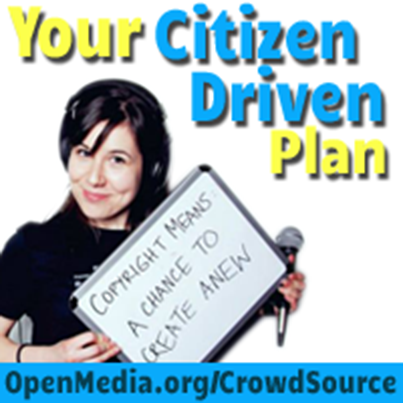How do you plan to create rules that support the wishes of all the people using the Internet without consulting all of the people who use the Internet? Democratic process needs to be followed when dealing with any system or structure that is relied upon by this many people.
This comment was put forward by an OpenMedia community member using our Digital Future tool last year, as ultra-secretive Trans-Pacific Partnership (TPP) negotiations were coming to a crunch. Although we knew the TPP was bad, our worst fears were confirmed late last year when Wikileaks released shocking information exposing just how severe the TPP would be for our digital future.
According to these leaks, the TPP will threaten our ability to create, share, and collaborate online. It will criminalize everyday users of the Internet for small-scale copyright infringement, and kick whole families off the Internet just for being accused of copyright infringement.
As we continue to fight the TPP, we can’t help but ask ourselves: How different might the Internet look five years from now and what will the future look like when it comes to accessing knowledge and sharing ideas online?
We need a positive alternative to the TPP’s Internet censorship plan. At OpenMedia we believe the best answers come from the community. That’s why, last fall, we asked you, the people who are most invested in the Internet — who drive it and create and share using it — to help shape our collective digital future.
And now, as we’re in the final stretch of pushing forward this digital roadmap, we’re asking for anyone who hasn’t yet taken our crowdsourcing survey to do so. Everyone should have a say in what our digital future should look like, so if you’ve contributed your thoughts at https://OpenMedia.org/Crowdsource, please help pave the way forward by sharing it with your friends on Facebook and Twitter.
Let’s take a moment to reflect on the very path that brought us here today, together with the help and support of our online community.
We know it seems like a long and tough road in the fight to safeguard our digital future. After all, it was back in February 2011 when we first heard about the Trans-Pacific Partnership (TPP) — a secretive and extreme trade deal being negotiated behind closed doors by 12 countries. It wasn’t long before leaked drafts of the TPP’s Intellectual Property chapter highlighted how the TPP could criminalize your online activity, invade your privacy, and cost you money.
So in June 2012, netizens of the world fought back. Over 135,000 people spoke out at StopTheTrap.net to push back against the TPP’s secretive attempt to break our digital future. Encouraged by the pro-Internet community, OpenMedia.org then launched OpenTheTpp.net — a tool to force your voices straight into negotiators’ TPP meetings. Our Executive Director Steve Anderson, then confronted bureaucrats with an iPad streaming your comments — a move we know showed decision-makers just how united the pro-Internet community was in fighting for a fair digital future.
It didn’t end there. In May 2013, together with pro-Internet groups from around the world, OpenMedia launched the Fair Deal coalition, the world’s largest multi-nation coalition promoting a positive vision of how users can continue to create, innovate, and share online.
We also sent a strongly-worded message in a hard-hitting Washington D.C. newspaper ad to U.S. Trade Representative Michael Froman, the then-new TPP chief, urging him to respect our digital rights. Not long after, we launched our Digital Future tool to start building the crowdsourced alternative to the backroom deals being pushed forward by big industry lobbyists looking to profit at the cost of global creativity and innovation.
It didn’t stop there. Beginning in September 2013, your voices united in a massive thunderclap in support of a free and open Internet. Since then, nearly 140,000 people have said NO to Internet censorship. That voice was heard loud and clear — clear enough for mainstream media to finally pick up on how important the fight for the open Internet has become.
We even hosted an Internet Town Hall in November 2013 to hear your questions, concerns and feedback.
Now, we want to take the next step by creating our positive crowdsourced plan for creating and sharing online. What should this plan look like? How can we access knowledge and share culture in a way that respects creators’ rights? And how can we continue to safeguard our digital future to support innovation, creativity, privacy and our fundamental right to freely express ourselves?
We’re asking everyone — and we mean everyone who uses the Internet — to join in.
Can you share your vision, tell your friends, and spread the world online? It will take five minutes of your time to use the Internet to save the Internet: https://openmedia.org/crowdsource



